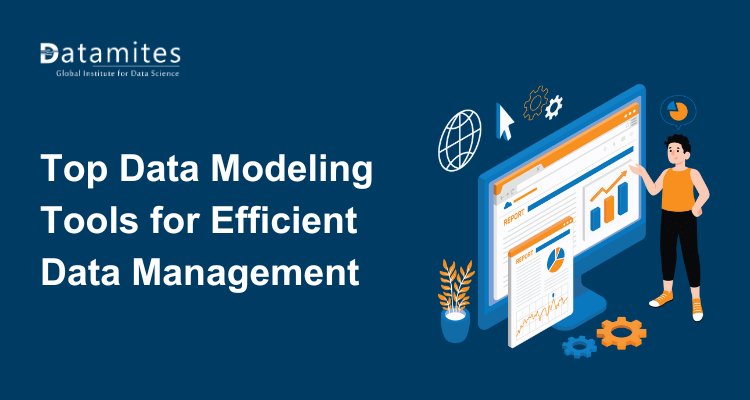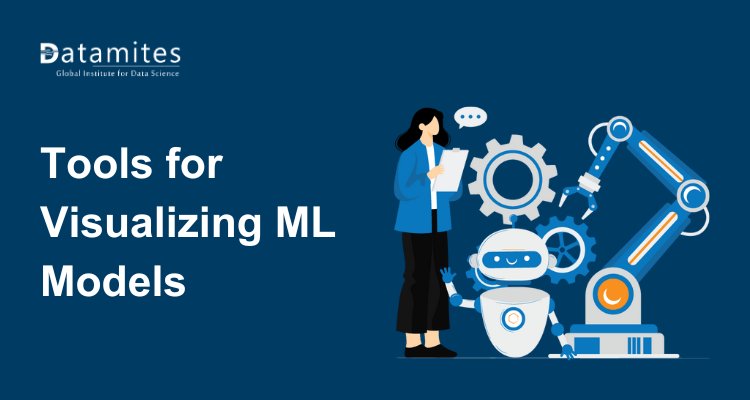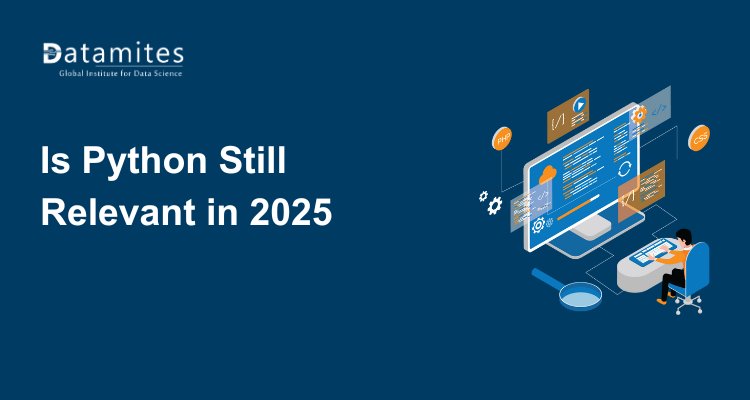Top Data Modeling Tools for Efficient Data Management
Discover the top 10 data modeling tools for efficient data management, relational databases, BI, and cloud systems. Learn applications, types of data models, and how to choose the right tool to streamline data handling and drive business growth.

In today’s data-driven world, organizations rely heavily on data modeling tools to structure, organize, and visualize information effectively. Data modeling is the process of defining how data is stored, related, and accessed in a relational database or any other database management system. It helps businesses translate complex data requirements into logical structures that improve efficiency, accuracy, and decision-making.
Understanding types of data models is critical in this process. The three common types include:
- Conceptual Data Models – Represent business entities and their relationships at a high level.
- Logical Data Models – Define attributes, primary keys, and relationships for better clarity.
- Physical Data Models – Provide the actual implementation details in a database system.
By combining these models, companies ensure that their data is well-structured, compliant, and useful for analytics. As businesses adopt advanced technologies like artificial intelligence, imapct of big data and cloud computing and storage, selecting the top 10 data modeling tools has become essential for smooth data handling and efficient management.
Why use Data modeling tools?
The increasing complexity of organizational data demands tools that simplify data structures and ensure consistency. According to a report by Allied Market Research, the Big Data and Business Analytics market, worth $225.3 billion in 2023, is expected to surge to $665.7 billion by 2033, registering a CAGR of 11.6% from 2024 to 2033. And here is how Data modeling tools allow businesses to:
Design relational databases with accuracy and consistency.
- Visualize relationships between entities to improve communication among teams.
- Support data warehouses and business intelligence systems by structuring large datasets.
- Ensure compliance with regulatory frameworks like GDPR and HIPAA.
- Streamline application development by providing clear database blueprints.
By using data modeling software, organizations not only improve performance but also enhance collaboration between business analysts, developers, and data engineers.
Refer to the articles below:
- How to Write an Effective Data Analyst Cover Letter
- Impact of Sales Analytics on Business Decisions
- Fraud Analytics: Key Tools and Techniques for Detection
Top data modeling tools for data management
Here are the top 10 data modeling tools that businesses can leverage for better database design and efficient data handling.
1. Erwin Data Modeler for data architectures
Erwin Data Modeler is one of the most trusted data analyst tools used worldwide. It provides a robust platform for designing, visualizing, and managing data architectures. Known for its strong relational database support, Erwin simplifies metadata management, improves governance, and allows reverse and forward engineering. Large enterprises prefer Erwin for its scalability and ability to handle complex systems.
2. IBM InfoSphere data architect for databases
IBM InfoSphere Data Architect is a powerful solution for large-scale enterprise systems. It helps design, deploy, and manage relational and non-relational databases efficiently. Its integration with data warehouses and big data platforms makes it one of the top data modeling tools for organizations handling huge datasets. Additionally, it ensures security and compliance while providing seamless integration with other IBM solutions.
3. Microsoft Visio for data models
Microsoft Visio may not be a dedicated data modeling platform, but it remains widely used due to its simplicity and visualization capabilities. Businesses use Visio to create conceptual and logical data models, flowcharts, and entity-relationship diagrams. Its ease of use and integration with Microsoft 365 make it suitable for small teams and startups that want to design relational databases quickly without investing in complex software.
4. Lucidchart for visualization
Lucidchart is a cloud-based tool known for its real-time collaboration features. It allows teams to design and visualize relational database schemas, process flows, and entity relationships. Lucidchart is highly interactive and integrates well with platforms like Google Drive, Slack, and Confluence. For businesses looking for user-friendly data modeling tools, Lucidchart is a great option for both technical and non-technical stakeholders.
5. Oracle SQL developer data modeler databases
The Oracle SQL Developer Data Modeler is a free yet powerful modeling tool. It allows logical, relational, and physical model creation for Oracle databases. Developers can also perform reverse engineering, making it easier to update and optimize existing systems. Being part of Oracle’s ecosystem, it ensures tight integration with enterprise databases, making it one of the top 10 data modeling tools for organizations heavily invested in Oracle technology.
6. SAP PowerDesigner for data integration
SAP PowerDesigner is a comprehensive data modeling solution designed for enterprises that require strong data integration. It supports complex architectures, impact analysis, and metadata management. With its visualization features, it helps align business processes with IT systems. Enterprises use it for designing relational databases, managing large-scale data environments, and improving data governance practices.
7. Toad Data Modeler for database development
Toad Data Modeler offers a flexible platform for database development across multiple systems, including SQL Server, MySQL, Oracle, and PostgreSQL. Its features include database reverse engineering, documentation, and multi-database support. Toad is ideal for developers and data engineers who need cost-effective data modeling tools that balance simplicity with powerful functionality.
8. dbt (Data Build Tool) for data warehouses
dbt (Data Build Tool) is a modern solution designed for data warehouses and analytics engineering. It allows SQL-based data transformations, integrates with version control systems like Git, and automates workflows. Unlike traditional modeling tools, dbt focuses on data transformation pipelines rather than visual models, making it a favorite for modern cloud-based analytics environments.
By choosing the right data modeling tool from these top solutions, businesses can streamline database design, enhance data governance, and ensure efficient data management to drive smarter decisions and long-term growth.
How to choose the right data modeling tool?
Selecting the right data modeling tool depends on business requirements and technical infrastructure. Here are some factors to consider:
- Database compatibility for database – Ensure the chosen tool supports your required relational database as well as modern cloud-based systems.
- Scalability of data– Choose tools that can handle enterprise-scale data warehouses. A scalable tool ensures smooth operations as your business expands without compromising speed or performance.
- Collaboration features in tools– Look for cloud-based platforms that allow multiple teams to work together. Strong collaboration features improve communication between analysts, developers, and business stakeholders.
- Automation and integration of the tasks– Select tools that integrate with ETL for data analytics and pipelines, BI platforms, and cloud services. Automation reduces manual tasks, saves time, and enhances accuracy in data handling.
- Cost and licensing of product – Compare free, open-source tools with enterprise-level paid solutions. Consider the long-term ROI, available features, and scalability before making an investment.
By analyzing these factors, businesses can pick the best tool that balances cost, features, and performance.
Applications of data modeling tools in data handling
Data modeling tools are widely used across industries for different purposes and across it courses in demand. Their applications include:
1. Data modeling tools for database design: Database design involves creating conceptual, logical, and physical data models that define how information is structured and stored. This ensures databases are efficient, scalable, and aligned with organizational requirements.
2. Data modeling tools for business intelligence: Accurate data models serve as the backbone of business intelligence systems, enabling reliable dashboards and analytics. By structuring data properly, organizations can drive smarter decisions with actionable insights.
3. Data modeling tools for data warehousing: Data modeling tools support the design and optimization of large-scale data warehouses. They help manage storage, retrieval, and transformation of massive datasets, ensuring speed and consistency in analytics.
4. System integration with data modeling tools: Data models map and connect information across different platforms like ERP, CRM, and HR systems. This integration allows seamless data flow between applications, improving operational efficiency.
5. Application development with data modeling tools: Developers rely on clear relational database blueprints generated by data modeling tools. This minimizes errors, accelerates development, and ensures applications align with business logic.
6. Data governance with data modeling tools: Strong data modeling enforces compliance with data privacy regulations such as GDPR and HIPAA. It also ensures consistency and integrity across databases, reducing risks in data handling.
7. Cloud data management by using data modeling tools: As businesses migrate to the cloud, data modeling tools help design and adapt databases for platforms like AWS, Azure, and Google Cloud. This ensures flexibility, scalability, and secure cloud-based operations.
These applications show how data modeling tools contribute to efficient data preparation for data analysis and data handling and organizational growth.
In the digital era, efficient data management is the foundation of innovation and business success. Understanding the types of data models and selecting the right data modeling tools can significantly improve performance, scalability, and compliance. From Erwin Data Modeler to dbt (Data Build Tool), each software solution offers unique advantages for database design, data warehouses, and integration.
By aligning business goals with technical needs, organizations can leverage these top 10 data modeling tools to transform raw data into actionable insights, streamline operations, and stay competitive in a data-centric world.
Refer to the articles below:
- How much will be the Data Analytics Course Fees in Mumbai
- Data Analyst Course Fee in Bangalore
- How much is the Data Analytics Course fee In Coimbatore
Enrolling in a Data Analyst course in Bangalore or other leading cities such as Mumbai, Pune, Hyderabad, Chennai, Coimbatore, Ahmedabad, Delhi, Jaipur, Kochi, and Kolkata helps aspiring professionals gain industry-ready skills, hands-on exposure, and a strong knowledge base to accelerate their data analytics career.
DataMites Institute offers a comprehensive portfolio of in-demand IT programs, including Data Science, Machine Learning, Artificial Intelligence, Python, IoT, and Data Engineering. With a curriculum designed for practical application, learners benefit from real-world projects, certified internships, globally recognized certifications (accredited by IABAC and NASSCOM FutureSkills), and robust placement assistance.
With both online and offline training options, DataMites has built a strong presence across India. Whether it’s a Data Analyst course in Mumbai or training centers in Bangalore, Pune, Chennai, Ahmedabad, Coimbatore, Hyderabad, Delhi, Jaipur, Kochi, and Kolkata, the institute ensures flexible learning pathways to help professionals strengthen their expertise and secure rewarding careers in data analytics.





